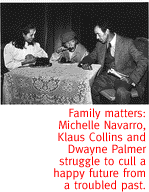
Richard Kalinonski's 'Beast Of The Moon' Is A Near-Perfect Production.
By Dave Irwin
GENOCIDE IS A tricky topic for art. Our horror at the atrocities
we've committed against ourselves compels us to be more emotionally
involved and less judgmental with works (in any media) on this
subject.
Richard Kalinoski's finely crafted Beast On The Moon is
a sensitive drama of the early 20th-century Armenian extermination
that shows us the personal cost of our darker selves. The Borderlands
Theatre production counterpoints this serious backdrop with deft
touches of personal humor, thanks to the impeccable timing between
leads Dwayne Palmer and Angela Michelle Navarro.
 The play follows two survivors of the Turkish pogrom in 1915-1918,
which killed more than a million and a half people and decimated
the rich and ancient Armenian culture.
The play follows two survivors of the Turkish pogrom in 1915-1918,
which killed more than a million and a half people and decimated
the rich and ancient Armenian culture.
Aram (played by Palmer), a successful photographer like his father,
has migrated to America with the last shreds of his family's legacy.
There he selects a mail-order bride from a photograph. But when
Seta (Navarro) arrives, the 15-year-old is none of the things
that Aram projected into the photograph. Instead of a woman who
will bear him sons, Aram finds he's married a scared girl, giddy
and hopeful, but still traumatized by the murder of her family.
In addition, the sense of tradition that hangs on their shoulders
ensures that neither will ever seek any escape from the marriage.
For better or worse, Aram and Seta are a couple, each slowly
understanding that they have no choice but to deal with the strengths
and weaknesses each brings to the union. The inevitability of
their being together heightens the personal drama and tension
between them.
Palmer plays Aram with an uncanny timing and delivery, emotionally
damaged in ways that only slowly reveal themselves. He gives a
perfect performance of a tradition-bound man, reserved and proud;
a character who aspires to his father's sternness, but who fortunately
can not find it in his heart to be that hard. Palmer gives his
character dignity and understated grace, which prevents Aram from
slipping into caricature. We easily empathize with the man unable
to be the stoic he thinks his wounds should make him, because
he still has a child-like sense of love and wonder. Palmer's discipline
in never letting his character go over the top in any direction
speaks well of his craft.
"I see Aram as devastated by what happened to him as a child,"
Palmer said after the opening-night performance. "He's got
a beautiful heart and the only way he can show it is by giving
gifts. As the play progresses, he learns about himself through
his new life."
The role of Seta demands more range of its player, as she goes
from coquettish girl to dutiful lover, to shamed wife, to resourceful
partner. Navarro plays the initial scenes with a too-jagged energy,
her gestures flighty and overly self-conscious. Even as her character
ages, Navarro seems to grow into the part, becoming more comfortable
as Seta matures and proves herself an equal to Aram, despite the
cultural requirements of subservience.
 The timing and chemistry that Palmer and Navarro bring is immediately
apparent. The comedic takes and playful exchanges mercifully take
the hard edge off the drama. Their characters are so dissimilar,
yet so suited, that we are constantly cheering for them to find
the happiness that seems destined to elude them.
The timing and chemistry that Palmer and Navarro bring is immediately
apparent. The comedic takes and playful exchanges mercifully take
the hard edge off the drama. Their characters are so dissimilar,
yet so suited, that we are constantly cheering for them to find
the happiness that seems destined to elude them.
Playwright Richard Kalinoski's script is near perfect. The only
awkwardness is the narrator's role. His purpose is unclear in
the early scenes, since much of what he relates would normally
be done by exposition between Aram and Seta. Warmly played by
community theatre veteran Dan Baerg, the narrator's purpose eventually
reveals itself with the introduction of street urchin Vincent,
played by ubiquitous child actor Klaus Collins.
Kalinoski's skill is especially evident in the multiple ways
in which he uses photography to illuminate his points. Aram, a
photographer, selects his bride from a photo. Seta turns out not
to be the girl in the photo, so Aram is immediately forced to
face what image means. His photos of Seta give us insight to what
he thinks are the important moments. Finally, the mutilated photograph
of his family illustrates the incredible horror that Aram has
witnessed.
The play debuted in 1995 at the prestigious Humana Festival in
Louisville, and has been produced in London, Toronto and Buenos
Aires. The playwright flew from New York to consult with Borderlands
Director Annette Hillman and the cast for two days to ensure an
optimal production.
Beast On The Moon is well worth the two-and-a-half hour
investment for its compelling and well-acted tale of the hopes
that emerge from our worst moments.
Beast On The Moon continues Wednesday through Sunday
through July 26 at the PCC Center for the Arts Black Box Theater,
2202 W. Anklam Road. Show time is 8 p.m. Wednesday through Saturday,
and 2 p.m. Sunday. Tickets are $12 general admission ($1 discount
Wednesday and Thursday), $9 for seniors and $7 for students (Friday
and Saturday student discounts only on available seats 15 minutes
prior to curtain). Call 882-7406 for information and reservations.

|





